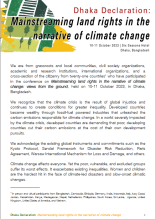Land Library Search
Through our robust search engine, you can search for any item of the over 73,000 highly curated resources in the Land Library.
If you would like to find an overview of what is possible, feel free to peruse the Search Guide.
/ library resources
Showing items 64 through 72 of 3524.This case study highlights the vulnerability of women in Fiaferana, who are disadvantaged, first, by their gender and indigenous heritage, and second, by their lack of tenure security in the midst of climate change.
For over a century, energy multinationals have been wrecking the planet and exploiting people in pursuit of profit.
Questions about how land is governed and controlled in the context of multiple crises are key to debates about fair transitions. The energy transition, net-zero ambitions, nature protection, and food system transformation all involve claims on land, water, and forests.
This country overview paper offers a perspective overview of climate change and land tenure rights in Bangladesh. It provides a review and analysis of how the official climate responses and those of other stakeholders impact on the land tenure, use and rights of people.
This video is about the everyday struggles of Munda people of Datinakhali Mundapara in Shyamnagar upazila (subdistrict) of Satkhira district in Bangladesh. Munda is one of the indigenous communities in the country.
We, the African Heads of State and Government, gathered for the inaugural Africa Climate Summit (ACS) in Nairobi, Kenya, from 4th to 6th September 2023; in the presence of other global leaders, intergovernmental organizations, Regional Economic Communities, United Nations Agencies, private sector
This case study presents the unique example of pastoralist communities in Kenya who had traditionally been able to rely on their customary land governance systems to ensure their access to grazing land and to help them sustain their livelihoods in the face of drought.
This document includes recommendations to different stakeholder groups (from governments to UN organizations) to operationalize a human rights-based approach to climate justice that affirms the link between climate action and land tenure security of the rural poor.
This policy paper reveals the urgent need for transformative change to secure equitable land rights for women and marginalized communities.









